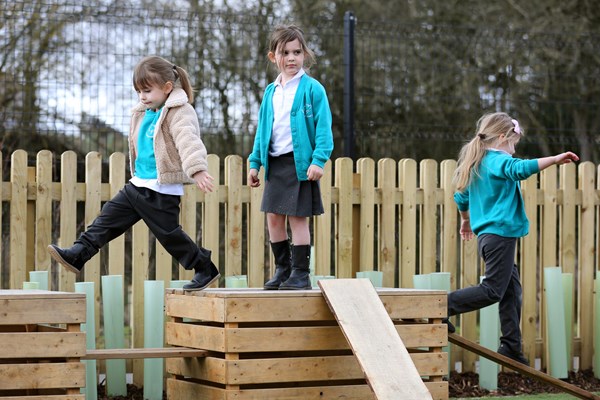Who is IQM?
IQM is the only national inclusion award in the UK. For over 20 years and in over 20 countries, schools, MATs and Local Authorities use the Inclusion Quality Mark to recognise exemplary inclusive practice.
Get in touch for your FREE school information pack today.
Ponteland Primary School Achieves Flagship Status
November 1, 2022

Ponteland Primary School in Newcastle Upon Tyne has achieved the Inclusive School Award with Flagship status.
 Inclusion values are deeply embedded
Inclusion values are deeply embedded
All staff, pupils and parents demonstrated throughout the day that the school’s inclusion values are deeply embedded. Everything is shaped around the school’s values – this month is a focus on respect – and staff are passionate about their opportunities to role model what they want to see from the children.
The headteacher is clear that “Inclusion means every single person – everyone – is equally important to us all”. Staff training keeps the team up to date and staff requests or interests are valued and reflected in the CPD (continuing professional development) offer.
The pupils’ behaviour and attitudes were positive and clearly supported and reinforced by the relationships formed between the staff and pupils. As one Year 6 pupil said, when asked what he would tell a prospective parent about his school, “We’re open to everyone”.
All staff I spoke to were very clear that inclusion is at the heart of the school’s ethos and that their inclusive successes are driven and supported by Senior Leaders, as well as peer support across the staff team. Open communication is key and colleagues who are knowledgeable about Autism Spectrum Disorder/Conditions are able to talk very openly to a member of staff with a diagnosis, enabling her to share her experiences and seek support where needed.
Staff focus on key families as appropriate where extra needs are identified, but there is no “tokenistic representation” (SENDCo) – each individual is valued as being unique and special.
Practice is based on action research; for example, the French specialist teacher had conducted research among Year 7 pupils and found that they perceived Modern Foreign Languages to lack relevance, which drove the project to run overseas visits and increase the cultural capital and immersion in a new culture, alongside language teaching.
 Less stigmatised extra support
Less stigmatised extra support
There has been a change of phonics scheme used in school, and a qualified teacher has been employed to lead its introduction and provide support to colleagues. Seeking a programme which would be consistent, show progression and be easy for staff to teach across their age range, the school also wanted something which would fit its ethos and allow individual teachers the creative space to personalise their lessons.
They selected ‘Little Wandle’ which allows some freedom around session planning and uses ‘Keep Up’ terminology to provide less stigmatised extra support.
Ponteland Primary wanted to ensure access to more complex language structures and all phonics elements for all learners, rather than repeat their experience of other schemes where learners can get ‘stuck’ and never experience particular elements.
Children are actively involved in the curriculum and were able to talk to me about the ways in which Art linked to their topics, a song they learned in the choir helped them to understand an aspect of global citizenship, and the teachers “think of really fun ways to teach you stuff so that you definitely get it!”
The school is in a new building, on a shared site with the leisure centre and secondary school. The environment inside and outside the building is not just new but pleasant, tidy, well maintained and clearly loved. A quick glance along the bookshelves, of which there are many, reveals a wide selection of literature, from fiction with a diversity of characters represented, to books such as Ibram Kendi’s “Antiracist Baby” which explicitly tackle particular inclusion issues.
‘Breaking the Mould’ 
When I asked about examples of how the school curriculum is daring, the IQM Lead talked about ‘Breaking the Mould week’ when they take opportunities to broach subjects and issues which children may be less familiar with. In Year 2 they explored the experiences of Rosa Parks and the Montgomery bus boycott.
Other topics included same sex marriages, and parents were supportive of the curriculum reflecting differences in people, backgrounds and relationships. Again there is a deep and strong trusting relationship and the parents who spoke to me voiced a trust in the school to get it right. The IQM Lead said “The curriculum also gives us scope to develop global citizenship. We have a theme each term, linked to our values and do community projects. In Year 3 they studied the experiences of refugees last term and linked it to the effects of war in Ukraine.”.
Years 5 and 6 take part in the young leaders award, which “turned into children leading the learning”. The SENDCo described starting with a key question – what’s the change you want to see in the future? And then being that change. They explored citizenship and agency, individuals’ little steps as well as big companies’ power, being able to influence others and create a ripple effect.
Flow charts are in place to clearly show the processes involved in whole school assessment and the graduated response to additional needs for support in English and Maths. The school uses BRP (better reading partnerships) to support where reading age is 8 to 10 months below a child’s chronological age. As was the case throughout my visit, equal emphasis was placed on the opportunity to build a quality relationship between adult and child, as on the support to decode and instil a love of reading. Engagement in lessons, reading and writing, access to the wider curriculum, expression of more imaginative ideas, access to complex language structures, are all supported by this targeted intervention. “A graded assessment system reflects finely grained progress.”
The SENDCo and Family Support Worker hold termly meetings before and after parents’ evenings with staff, to ensure monitoring is up to date and respond to any information coming through the discussions. Referrals to the ‘Friends’ resilience intervention and Counselling in school can be made through them. They keep the door open, often saying “Tell me about anyone else” to ensure nobody is missed. Initial concern forms are used, and stored securely on the staff’s shared drive so that teachers can see others’ concerns and build skills in identifying needs and referring for support.
The Art specialist also offers art therapy. One of the children I spoke to was open about having attended, and said it had helped them a great deal to have the space and time to explore, and create open-ended expressive artwork. Again, the relationship was key, as the child also “loved having [the Arts lead] all to myself for a bit”.
 ‘It’s full of friendly people’
‘It’s full of friendly people’
All the children I spoke to were clear that their needs are met very well, that everyone is valued and that they can go to teachers with any worries or questions. A girl in Upper Key Stage 2 said she would tell someone new to school that “They would always be safe here and have fun”. A Year 1 boy I sat with at lunchtime said, when I asked what he likes about his school, “It’s all full of friendly people.”
Staff feel equally safe, valued and respected. An EYFS teacher said, “Relationships are top. I’m in Nursery but we have good relationships right through the staff – communication, Whatsapp, emails, anyone will do anything for you. The SLT are so approachable and there’s nothing I can’t discuss with them.”
The school is very proud of a member of staff who is a former pupil of the school and long-time volunteer, who began a paid role in September as a Teaching Assistant. She says she has been well supported in making the change from volunteer to staff member, and her Autism Spectrum condition has been not just accommodated or tolerated, but valued and celebrated. Her colleagues value her direct experience and have learned a lot from her interactions with, and assessments of, children coming into school.
The EYFS teacher went on to praise the staff training offer, saying, “I can ask if I’m curious about something; I’ve had more CPD here in 3 years than I did in 10 in my last school. The SLT [senior leadership team] are very open. In staff meetings we discuss rather than being told what is happening – there is a direction in mind but it’s a team effort.”
Again, practice is based on action research and staff have targets for the year. They report to governors and to each other on their reading and learning to keep them up to date with current developments. This teacher had investigated fine motor interventions and evaluated their impact on learners to assess which to introduce to the Nursery.
One parent told me, in the context of her child’s identified Special Educational Needs, “I couldn’t be happier to have my children in this school. SEND is not an add-on, it’s embedded in what we do. The SENCO has been instrumental – the classrooms are accessible and there is no stigma around needing something different.
“It’s scary as a parent going through assessment. [Key staff] support brilliantly and manage your expectations. If I’d gone into that meeting with CYPS [alone] it would have been scary but they support parents to talk to professionals to get the best for their child.
“Parents of SEND children don’t need to bang on the door and fight for rights because it’s so intrinsically part of what we do. It’s not discrete meetings with the SENDCo, it’s ongoing communication all the time. The teachers are really confident about supporting parents and communicating with them.”
Able to ask for support
Another parent spoke of feeling able to ask for support from staff, and her daughter accessed the Paris trip as the family circumstances were picked up on by school. She felt able to approach school because she knew a key member of staff would listen, and the relationship between them was strong. After the Paris trip, she saw a new side to her daughter, with more confidence and independence. She appreciated the “Confidence boost for a second-born child to feel as if she has a bit of an advantage – in French lessons she has a real understanding now.”
She remarked that, “I’d put this school forward because of the support. None of my kids have ever not wanted to go to school, they can’t wait to go to school. I don’t have any worries – they feel safe enough that if there was an issue, they could speak to someone, and it would get sorted. You don’t really know your child and when you see school reports it really shows a side of them that you can celebrate and know that they are really doing well.”
This parent also appreciated the range of communication methods used by the school; she found paper letters less helpful and was very pleased that emails and texts are used. She also mentioned the staff at the reception desk and all the class teachers, who helped her to keep on track as she has children in different year groups and lots to remember.
 This school is at the heart of the community, and the community is at the heart of the school. As the Reception TA said, “Everybody is included”.
This school is at the heart of the community, and the community is at the heart of the school. As the Reception TA said, “Everybody is included”.
The global citizenship curriculum runs alongside the national curriculum, and the Headteacher talked proudly about convincing more sceptical visitors to school, who have now seen the benefits of their integration. Children in Key Stage 2 talked to me about global issues, including plastic pollution and climate change, and the learning walk showed displays throughout school reflecting global and local concerns. The children talked about small actions making a difference, and clearly felt they have agency to make some of the changes they want to see.
The school’s flagship project, FLOW, will further strengthen the already good links with the local community, and this is a driving aim, shown by the choice of the leisure centre, rather than school, as the venue. The staff take an active, leading role in projects, bringing others in alongside and inspiring collaboration across Ponteland and beyond.
Find out more about the IQM Inclusive School Award
If your school is interested in obtaining the IQM Inclusive School Award or you wish to talk to a member of the IQM team please telephone:
028 7127 7857 (9.00 am to 5.00 pm)
or email: info@iqmaward.com for further details.
Want more information on the IQM Award? Click here to request your free IQM information pack
Other Posts

About IQM
The only national award for inclusion in the UK, IQM has been committed to recognising exemplary inclusive schools for over 20 years and in over 20 countries around the world. The three awards allow schools and organisations to celebrate their inclusive practice against nationally recognised framework.
Site Links
© 2026 Inclusion Quality Mark | website developed & cared for by digidoda


